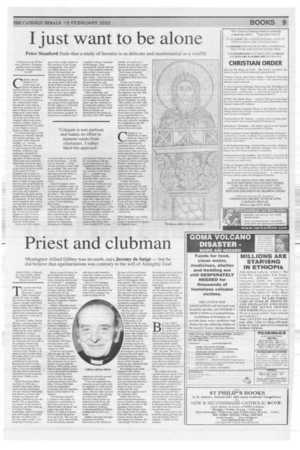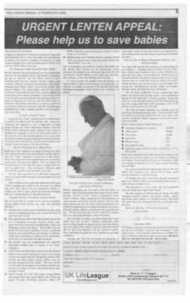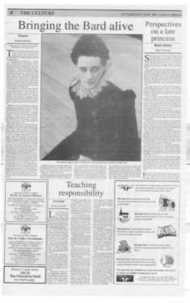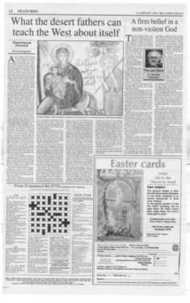Page 9, 15th February 2002
Page 9

Report an error
Noticed an error on this page?If you've noticed an error in this article please click here to report it.
Tags
Share
Related articles
`he Had More Effect On The Growth Of The Church In These...
Glenys Roberts Has Published The Commonplace Book Of...
Sociable Monsignor
Mgr Gilbey — A Poet From Another World
The Enduring Appeal Of Mgr Alfred Gilbey
Priest and clubman
Monsignor Alfred Gilbey was no snob, says Jeremy de Satge — but he did believe that egalitarianism was contrary to the will of Almighty God Alfred Gilbey A Memoir by some friends, edited David Watkin, Michael Russell Ltd £15 To anyone who had come across Monsignor Alfred Gilbey during his almost 97 years on earth. this book is sheer delight. I suspect, though, that it will have a wider appeal. as Alfred Gilbey was without question the best known priest of his generation and, as an obituary of him put it, the best loved.
The book's editor. David Watkin. is proud of the fact that the 13 contributors range in age from 23 to 93, reflecting the way Alfred's youthfulness of spirit enabled him to make new friends at an advanced age. As someone who was one of his younger friends and knew him for a mere 20 years of his long life. I can vouch for this. Watkin is at pains to point out that there are many others who could have equally well contributed to this book. Because he lived so long and outlived his contemporaries. it was an inevitable pity that there could be no contribution from someone who knew Gilbey in his youth.
Alfred Newman Gilbey was born in 1901 into a wealthy mercantile family (wine and gin merchants) and was raised at Mark Hall, near Harlow in Essex. His mother was Spanish and brought Catholicism into the family. The young Gilbey was taught by the Jesuits at Beaumont and then went up to Trinity College. Cambridge, where he clearly had a thoroughly good time but did very little work his "mis-spent youth" as he would put it in later years. Being a man of means, he then trained for the priesthood under his own patrimony (meaning that he paid for it himself — something not now allowed by Canon Law), studying at the Beda College in Rome. Rather eccentrically, he was ordained priest in the drawing room at Mark Hall by Bishop Doubleday of Brentwood in 1929.
Gilbey's first three years as priest were spent as secretary to Doubleday, to whom he remained devoted. But it was in 1932 that Gilbey started his real mission by becoming Roman Catholic chaplain to the undergraduates of Cambridge University, residing at Fisher House, and where he remained for a remarkable 100 terms, leaving under somewhat strained circumstances in 1965.
If that was not remarkable enough, the "Mr Chips" of Cambridge then moved to London to retire. 1-lis retirement was to last a further 33 years until his death in 1998, during which time he quite simply carried on his apostolate to members of his Cambridge flock, adding further members along the way. He made a permanent home at the Travellers' Club in Pall Mall, where he entertained constantly and cut a familiar figure on the streets of St. James's.
The Oratorian Ronald Creighton-Jobe makes an impressive contribution to the book in his essay on Alfred Gilbey the priest. He makes the point that in Gilbey it is almost impossible to separate the person from the priest. This was his great gift, and it allowed him to be remarkably intimate with those with whom he came into contact: it was far more than just a professional relationship.
His love for Almighty God vibrated from every fibre of his being. He was both a pastor and friend and when in his company one could not help but be impressed with the unconditional love he exuded.
It was not surprising that someone of such style could be regarded as controversial, and Gilbey was not without critics. He was often accused of being elitist, only mixing with those of high birth. Several of these points are addressed in the book, the most impressive contributions being by Nicholas Lorriman and David Watkin, perhaps the two he loved most.
Gilbey's pet hate was egalitarianism; he firmly believed it to be contrary to the laws of God and nature. He was always to point out that Almighty God loves each of us uniquely rather than equally. This may seem to some a question of semantics, but it was a vital distinction for Gilbey and one that flavoured his whole philosophy. He believed in the order of hierarchy, and those who did not know him properly mistakenly imagined that elitism and snobbery were part of his character.
He was no snob. 1-lis door was open to anyone who wished to see him and he made friends with people of all walks of life. He was conscious that his own family, although rich, was not historically grand. His childhood home. Mark Hall, was rented rather than owned. He was of merchant stock and proud of it. Being half Spanish saved him from the pompous and reserved nature of the stiff upperlipped Englishman. It was remarkably refreshing that almost all his friends, of whatever age. addressed him by his Christian name.
The liturgical and other changes to the church following the Second Vatican Council caused a great deal of pain to many, and it was not surprising therefore that Gilbey became something of a guru to those, young and old, who mourned the suppression of the Tridentine Rite.
Gilbey himself was granted permanent permission to continue celebrating the old Mass and this he did regularly at the London Oratory, Farm Street, in his tiny chapel at the Travellers' Club and once a month at his cousin's house, Rosehill, near Henley-on-Thames. He cared deeply for those who felt dispossessed by the liturgical changes but did not relish being such a bedrock. As always, his concern was for the spiritual care of the individual.
Right up to the end of his life he continued to make new friends and his sense of optimism even when very frail was impressive, despite his personal dislike and disapproval of so much of the modern world. He was particularly fond of the psalmist's line, "Be still and know that I am God'', which was at the root of his trust in Divine Providence.
By early 1998 it became clear that he could no longer live at the Travellers' Club where there were no nursing facilities. He moved to Nazareth House in Hammersmith. I visited him there shortly after he had moved in. One of the Sisters came up to me. "Oh", she said. "We are so worried. Monsignor is determined to have dinner at the Travellers' Club and wants to go there by public transport. Can you stop him?" I felt that this was so typical of him.
We walked down the corridor and saw many of his fellow residents, all considerably younger than him. asleep in their wheelchairs. I realised that 1 would not be able to persuade him to cancel a dinner engagement. When Sister learned that 1 had my car with me, she was much relieved. I took him to the Travellers' and made him promise to take a taxi back to Hammersmith. It was the last time I saw him; he died two months later. .
There is much more in this book that space prevents me from describing. Read it instead — highly recommended.
blog comments powered by Disqus













